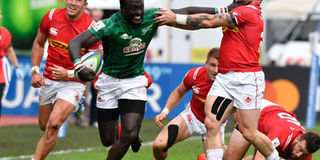THE BREAKDOWN: Let's reflect on an eventful year in Kenya rugby

Kenya's wing Collins Injera (C) is tackled during the 2019 Japan Rugby Union World Cup qualifying match between Canada and Kenya at The Delort Stadium in Marseille on November 11, 2018. PHOTO | GERARD JULIEN | AFP
What you need to know:
- Sylvia Kamau takes over from Ronald Bukusi as KRU's CEO in acting capacity.
- Ian Snook and Murray Roulston fail to inspire Kenya Simbas to qualify for Rugby World Cup.
- KRU reintroduces Rugby Super Series.
- Safari Sevens makes a comeback to RFUEA Grounds, Ngong Road.
As we close out 2018, we reflect on a year that has seen Kenya rugby teeter between lows and highs and some time sink to shameful levels.
We’ve seen the men’s national teams struggle in both sevens and fifteens code. The under-20 team on the other hand put up some eye catching performance in Namibia during this year’s Barthes Cup. The ladies team had an encouraging outing both in Gaborone for Africa Women Sevens, where they were crowed champions, and in Dubai Sevens earlier this month.
Administratively, the game’s governance has never come under so much scrutiny. First a number of commercial partners left or simply saw their contracts run out due to what many have termed as a “board lacking an ounce of integrity.”
Secondly, Richard Bukusi quit as Kenya Rugby Union chief executive in August and was replaced by Sylvia Kamau in acting capacity. Kamau, herself an elected KRU director, has had to guide the union through tempestuous period.
She has had to oversee the recruitment of sevens national team technical bench and a botched 2019 Rugby World Cup qualification campaign virtually on empty coffers. She has had to put use her diplomatic and soft skills to try and ensure that national teams, secretariat and development activities don’t grind to a halt. I wish her the best, if she is confirmed as the substantive CEO.
It is this same year that Safari Sevens made a comeback to fabled spiritual home at RFUEA Grounds on Ngong Road. The once premier sporting activity in the country looked a pale shadow of it's former glory. KRU, commendably, went to great lengths to make sure it was a success. But when a local sevens leg, with less personnel and resources, is better attended then the Local Organising Committee's work is well cut out.
Away from the boardroom, what is going on the pitch paints a picture of the sport in distress and in need of stabilisation. Ian Snook and his assistant Murray Roulston were brought in March and tasked with preparing Kenya Simbas for Gold Cup, that also served as Rugby World Cup qualification campaign.
The New Zealanders tinkered with the team’s lined up till their last match of the year against Germany. They couldn’t settle on a recognizable line up, moving players around the park like pieces of chess. They never achieved any of set targets. Reports indicate that their contracts will not be renewed and they will not flying in after Christmas break.
In 1973, Australia suffered embarrassing loss to Tonga 16-11 and it went down as one of Australia's worse loss in Rugby history to a small minnow nation. The loss prompted a group of Australian businessmen to fund a fact finding mission to Wales. The basis of that report set up a national coaching programme with Dick Marks as national coaching director. Australia subsequently established a reputation for being the smartest rugby nation led by the most innovative coaches. That is no longer the case.
Have we reached a soul-searching moment as a country when we should fund an inquest in country’s unsatisfactory performance on an international stage? Is the problem the calibre of coaches our players go through every day before being handed over to national team coaches? Do we have enough quality and depth of coaches that can take the national squads and innovatively restore the country’s belief in them? Are we doing enough to train and develop coaches from grassroots level to the highest stage?
I would like to believe that director of rugby Thomas Odundo has a comprehensive plan and strategy in place to help in this facet of the game.
Former KRU development officer Fred Ollows has spoken glowingly of franchise rugby in the country. He argues that the disbanded Rugby Super Series provided the link between club and international rugby, arguing that Test players should be picked from this tournament rather during trials as was this year.
“Traditional trials don't quite show everything serious selectors want to see. They are, in any case, too short and there are too many players for that time frame. A month long event with players taking on different opponents is a different story,” he wrote on his Facebook page in April.
I do agree with him that franchise rugby will bring the best out of Kenyan players. National team selectors will have a chance to watch the best Kenyan players against their peers for a period of four weeks. This is an opportunity to see what these players can do in competitive and pressurized atmosphere with little training and less cohesiveness, akin to the national team set up.
It is commendable that KRU has reintroduced the competition at the end of the season. We hope the next Simbas technical bench will be in place to help in imparting their philosophy to the various franchises.
We only hope that Kenya rugby has learnt hard lessons from the 2018 turbulence. As we break for festivities, we hope that managers of the game will use this opportunity to reflect on their work and come back with fresh ideas in 2019.
Let us continue this conversation on Twitter @kollonabiswa.



